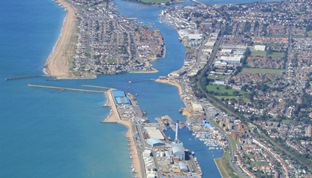The SmartHubs energy management project gets underway
The SmartHubs Smart Local Energy System (SLES) project is moving ahead in West Sussex.

SmartHubs is a £31 million part-funded pilot to integrate energy management across social housing, transport, infrastructure and private residential and commercial properties. The funding is provided through the Government’s modern industrial strategy by Innovate UK, part of UK Research and Innovation. Their ‘Prospering from the Energy Revolution’ challenge is an overall £102 million investment from the government to develop smart systems that can support the global move to renewable energy.
The SmartHubs project will revolutionise the way energy is generated, stored, shared and consumed and features homegrown UK Clean Tech pioneers coming together to grapple with the challenge of the energy transition. SmartHubs brings together innovative technology systems and financing models to deliver a replicable, scalable, distributed energy resource management system.
The SmartHubs consortium consists of:
- Connected Energy – energy storage using second-life electric vehicle batteries
- PassivSystems – hybrid low-carbon home heating systems using air source heat pumps to complement gas boilers
- ICAX – sustainable heating from recycled heat using a marine source heat pump
- Moixa – software to integrate, manage and optimise renewable energy and energy storage in a virtual power plant (VPP)
- ITM Power – generation of low-carbon hydrogen gas for transport
- Newcastle University – data analysis and system modelling for the project
- West Sussex County Council – supporting use of smart assets to meet its carbon goals

Massive project for a massive challenge
“SmartHubs is a massive project for a massive challenge, working with a local authority committed to both the Climate Change Agenda and supporting SME scale up,” said Matthew Lumsden, Connected Energy CEO and Chair of the SmartHubs Steering Committee. “Bringing together innovative technologies and integrating them on this scale is an exciting proposition and one we’re keen to see replicated up and down the country to help manage the climate emergency we’re facing”.
“Each of the technologies involved in the project have differing degrees of maturity and therefore are attractive to different types of investors – part of the challenge when bringing together energy systems is not only the physical integration of the technologies, it is also to find appropriate investors to co-fund the project and understand the holistic nature of it,” said Matthew.
Partners in the SmartHubs Consortium

Connected Energy will deliver a 12 MW in-front-of-the-meter battery energy storage system in Sompting, West Sussex, as well as nine 300 kW behind-the-meter battery systems across the region, and up to five EV charging hubs with integrated photovoltaics and battery energy storage. These systems will use around 1,200 second-life electric vehicle batteries and provide grid balancing across the whole project. The 12 MW system alone has a total capacity of 14.4 MWh, the energy equivalent of powering 1,695 average homes for a whole day.
Moixa’s GridShare technology will power the SmartHubs VPP which will aggregate and manage the large fleet of hybrid systems across transport, heat and power to deliver flexibile services into ancillary markets ensuring system reliability and delivering a stronger, cheaper, cleaner network. Moixa will also provide 250 smart photovoltaic battery systems to deliver sustainable, low-carbon energy to social homes, schools, businesses and the local public sector in West Sussex, and up 250 electric vehicle charging points to support the transition to low carbon transport.

ICAX is designing and installing a marine source heat pump to transfer heat from the sea water in Shoreham Harbour to heat adjacent buildings of the Shoreham Port Authority. ICAX which has developed Interseasonal Heat Transfer to enable buildings to be heated in winter with solar energy captured in the previous summer and is providing the marine source heat pumps at the heart of the heat network and designing the abstraction and rejection systems for heat exchange with the sea.

PassivSystems will install 250 air source heat pumps in domestic social and private homes both on and off gas grid. The smart controls within the heat pumps will learn algorithms and analyse data points within the homes to learn their thermal properties. Weather information and users' behaviour will then be overlaid to predict demand and optimise the efficiency and respond to demand side response (DSR).
ITM Power is designing, building and deploying a 2 MW electrolyser to enable onsite generation of hydrogen for a bus and passenger car refuelling station. This provides zero carbon fuel for transport but will also support the local energy system with a 2 MW load which can be switched on or off to enable better management and control of the electricity system.
Newcastle University’s Electrical Power Research Group will use mathematical models to evaluate the whole series of network management techniques used in the project covering the multiple energy vectors to be employed in the local energy Smart Grid, both individually and as an energy systems integration. The modelling will cover both energy efficiency and a full cost benefit analysis.

West Sussex County Council which, in co-ordination with Adur and Worthing Councils, will establish a multi-vector local smart grid in Shoreham-by-Sea and develop a new procurement approach for smart grids that can be replicated elsewhere and be financeable.
Prospering From the Energy Revolution
Rob Saunders, Challenge Director, UKRI: “The climate emergency is one of the most serious issues facing the world and the Prospering From the Energy Revolution challenge is a crucial component of the UK’s strategy to address and drive forward the actions required to shape clean energy for the future. The SmartHubs demonstrator has shown a revolutionary approach in combining expertise and innovation across energy generation, storage and use with game-changing technologies combined into a cleaner, more flexible system that is fit for the future. Investing in these energy systems of the future – more localised, more intelligent and built on renewable sources to deliver cheaper, cleaner energy – will be central to the UK’s net zero plans and the SmartHubs project has shown the potential to be an exciting part of this strategy.”
SmartHubs is one of four Innovate UK demonstrator projects being built over the next three years to illustrate how integrated smart local energy systems can deliver power, heat and mobility to users in new and better ways.
Smart Local Energy Systems
The four projects winning funding for smart grid demonstrators from the Industrial Strategy Challenge Fund are:
- The Energy Superhub, Oxford
- ReFLEX Orkney, Orkney
- Project Leo, Oxfordshire
- SmartHubs SLES, West Sussex
See Ground Source Heating See Ground Source Cooling See Ground Source Energy See Smart Grids

